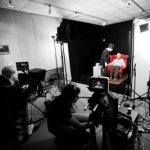In the era of social media, antisemitism and Holocaust denial are no longer hidden in the margins, spewed by fringe hate groups. From Ye – formerly known as Kanye West – and NBA player Kyrie Irving to members of Congress on both sides of the aisle, well-recognized personalities have echoed antisemitic ideas, often online. Rather than teaching the Holocaust as an isolated event, educators must grapple with how it connects to antisemitism past and present. That means adapting to how people learn and live today: online.
Connecticut saw a record high number of antisemitic incidents last year. The Holocaust remembrance movement says “never forget,” but surveys find the problem is deeper — many young people lack basic knowledge of the Holocaust. On the next Cutline, we hear personal stories – then and now. We look at links between antisemitism and extremism, visit a Connecticut classroom teaching the Holocaust, and explore the story of Sobibor, a secret Nazi death camp that was a site of bravery and resistance.
“When someone feels like their rights are being violated or the government is overstepping their bounds, they’ll cite the Holocaust, which is very dangerous,” says Alan Marcus, a professor in UConn’s Neag School of Education.
Marcus recently was part of a team that produced a research study that was published in “Holocaust Studies” that examined the transition of Holocaust education from live to virtual survivor testimony. Marcus also wrote a column for The Conversation on the issue.
Like members of the Greatest Generation, living Holocaust survivors provide a powerful tool in teaching students about the past.
As the number of Holocaust survivors worldwide continues to dwindle each year, the question of how to preserve the stories of survivors as a means of remembrance and education becomes ever more relevant. Alan Marcus, associate professor in curriculum and instruction, is working to answer that question through research on three-dimensional, interactive technology.
In his recent text entitled “Why we need to rethink how to teach the Holocaust”, professor Alan Marcus, from the University of Connecticut stresses the importance of the Holocaust survivors in education, stating the following: “Without survivors, the Holocaust will pass into being taught strictly from learned memory.”


